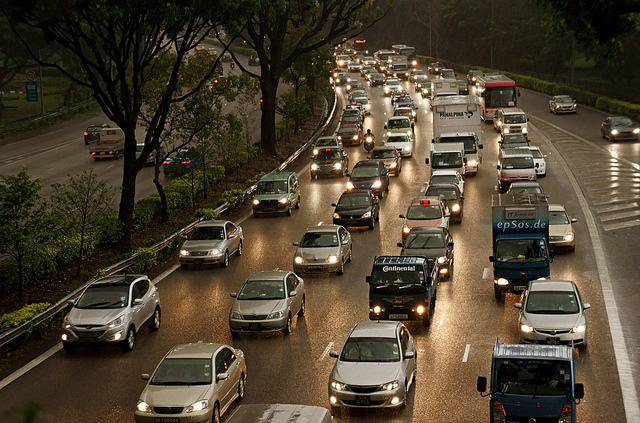
A government plan to add spectrum to Wi-Fi's 5GHz band might interfere with vehicle-to-vehicle wireless networks that would improve highway safety, dozens of auto industry representatives said in a letter to the Federal Communications Commission today.
The FCC's planned Wi-Fi expansion would result in the 5GHz band stretching from 5.150GHz to 5.925GHz, improving wireless Internet access in homes and public areas. This requires sharing airwaves with Dedicated Short Range Communications (DSRC) in the 5.850-5.925GHz part of that spectrum. As we've written, DSRC could eventually enable wireless mesh networks on highways, allowing cars to cooperate and thus avoid accidents.
"The Intelligent Transportation Society of America (ITS America), along with major automakers, safety advocates and transportation officials from across the country, are joining together to urge the Federal Communications Commission (FCC) to protect the 5.9 GHz band of spectrum set aside for connected vehicle technology—which is expected to save thousands of lives each year—from potentially harmful interference that could result from allowing unlicensed Wi-Fi-based devices to operate in the band," the trade group said in an announcement.
The actual content of the group's letter shows that industry players aren't taking a hard line against the Wi-Fi expansion. The letter asks the FCC to perform "due diligence" on the issue of possible interference, and that a final decision on the Wi-Fi expansion come after a US Department of Transportation decision on implementing a connected vehicle network.
In addition to automakers such as Volvo, Chrysler, and Hyundai-Kia, the letter was signed by various researchers and even government officials, such as state transportation officials in Texas, Washington state, Michigan, and California.
The National Telecommunications & Information Administration (NTIA) has also said the potential interference must be studied closely. The ITSA letter echoed the NTIA's position, saying "We share NTIA’s concern about the potential risks associated with introducing a substantial number of unlicensed devices into the 5.9 GHz band on which connected vehicle systems are based, and support NTIA’s conclusion that further analysis is needed to determine whether and how the multiple risk factors could be mitigated."
The vehicle concerns by themselves may not be a deal-breaker in the plan to expand Wi-Fi spectrum, but they are indicative of how complicated and lengthy the process could be. The NTIA has said it won't finalize its recommendations to the FCC until December 2014.
The FCC was certainly aware that its proposal requires the use of spectrum already dedicated to other uses, and has acknowledged that significant cooperation with federal agencies is needed. Ultimately, sharing this spectrum between Wi-Fi and other uses might require a database similar to the ones used for White Spaces networks. Such a setup will probably also be used for the FCC's plan to share government-controlled spectrum with cellular providers.
A sharing system may well be good enough to prevent interference between cars on the roads and Wi-Fi users in buildings, particularly as 5GHz airwaves don't travel as far as the ones in the 2.4GHz Wi-Fi band, or the ones typically used for cellular networks. Given the nearly two-year timeline for the NTIA to do research and report back to the FCC, there's little reason to think anything harmful will happen to the future smart car networks, but the process may impact how the Wi-Fi expansion is implemented.
Oh and just in case you were wondering, this is completely unrelated to the false "free Wi-Fi everywhere" story that we had to debunk last week.
reader comments
36